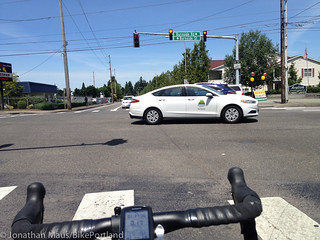Hit and runs are far too common in Oregon. Unfortunately, so is the feeling of helplessness about what to do about them. In the spirit that knowledge equals power, I’ve put together a primer on the laws surrounding hit and runs and what do to if you are ever involved in one.
Here’s the sad but true fact: If a vehicle operator* can escape a collision scene then the chances are they will get away without having to pay for the damage they caused and they can also avoid things like: arrest on an outstanding warrant; a DUI charge for driving/riding while impaired; a possible police search of the vehicle for drugs or contraband on board; a car with no insurance, or not having a drivers’ license.
If the perpetrator is ever caught (and they usually are), here’s what the law says about their crime.
Oregon Revised Statute (ORS) 811.700 makes it a Class A misdemeanor not to stop and remain at the scene of any collision where any property is damaged in order to exchange registration information and the name and address of the driver and any vehicle occupants, and upon request to show the driver license. Further, ORS 806.011 requires that proof of insurance coverage be carried in every motor vehicle.
We know this is a maddening crime and it’s even worse if it happens to you; but if you just give up before starting, there’s is no chance the person will ever get caught and held accountable.
—
If someone is hurt then ORS 811.705 makes “Failure to Perform Duties of Driver to Injured Persons” into a Class B or C felony. Included in the legal requirement where someone is hurt is the obligation to give “reasonable assistance” including transport for medical treatment.
The duties at the scene of a collision even extend to witnesses. ORS 811.715 requires that witnesses to an injury collision furnish their name and address to occupants or drivers of involved vehicles and makes it a Class C violation (non-criminal) to fail to do so.
Advertisement
What if it happens to you?
If you are the victim of hit and run call 911. If possible have witnesses give you all information about the fleeing party and retain their contact information. It is important that you go through the process because if you do not report the collision the police will not be able to find the fleeing suspect. And if you are injured it is important that you file a police report in order to make an insurance claim (yes, an insurance claim, your own car insurance may cover your injuries!).
About insurance
Oregon automobile insurance covers hit and run collisions where a person is hurt by a motor vehicle, even where the victim is on foot or a bicycle. Automobile insurers in Oregon are required to include in every policy what is called Uninsured Motorist Coverage which includes special Hit and Run coverage. However there are technical requirements for coverage so be mindful that one must follow certain basic rules:
- First, the collision must be mostly the fault of the person who left the scene;
- Second, a report of the collision must be made within 72 hours to law enforcement and the claim must be reported to the insurance company within 30 days;
- Third, if there is a “vehicle” occupied or operated by the injured party it must be available for inspection by the insurance company.
Note that even if the hit and run suspect has caused the injury without actual contact with the injured person or their vehicle, this “phantom vehicle” claim can still be made so long as “the facts of the accident can be corroborated by competent evidence other than the testimony of the injured person”, ORS 742.504(g)(B). While this sounds like a tough requirement, if care is taken to gather evidence from the scene, gather witness information, and preserve any evidence showing the way the incident happened without an actual collision, then a successful claim may be made for all the damages including medical costs, wage loss, and pain and suffering.
Be persistent and follow through
If you or someone you know gets in a hit and run incident don’t give up without going through the steps necessary to report and follow through on each step. While the reason people take off from the scene of a collision is that a lot of times they get away with it, if you report it to the police and keep checking in with the investigating officer to learn about progress, at least you have done what you can. And make sure to check and see if there is existing insurance to cover damages.
We know this is a maddening crime and it’s even worse if it happens to you; but if you just give up before starting, there’s is no chance the person will ever get caught and held accountable.
*The ORS that refer to hit and runs, use the word “driver” as the default. I prefer the more mode-neutral term “vehicle operator” which makes it more clear that any type of vehicle operator using the public right of way — whether riding a motorcycle or a bicycles — can be found guilty of leaving the scene of a collision.
Browse our Get Legal with Ray Thomas story archives to learn more about Oregon bike law.
Disclaimer: This article is part of a paid promotional partnership between BikePortland.org and Swanson, Thomas, Coon & Newton.



